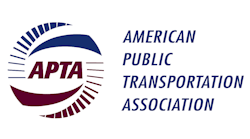APTA August Transit Savings Report
Even with the low fuel prices this summer, riding public transit instead of driving still saves hundreds of dollars a month and thousands every year.
The annual savings is $9,634 for a person who switches their daily commute by car to taking public transportation, according to the American Public Transportation Association's (APTA) August Transit Savings Report. Individuals who ride public transportation instead of driving can save, on average, more than $803 per month. And the benefits from public transportation extend far beyond your wallet—across the country, public transportation is the backbone of the economy.
In communities large and small, the benefits of public transportation are plentiful. Public transit systems increase property values along their lines, create destinations for businesses, and form the basis for livable and walkable communities.
These savings are based on the cost of commuting by public transportation compared to the cost of owning and driving a vehicle which includes the August 16, 2016 average national gas price ($2.13 per gallon- reported by AAA), and the national unreserved monthly parking rate numbers.
APTA releases this monthly Transit Savings Report to examine how an individual in a two-person household can save money by taking public transportation and live with one less car.
The national average for a monthly unreserved parking space in a downtown business district is $166.26, according to the latest report of the Colliers International Parking Rate Study. Over the course of a year, parking costs for a vehicle can amount to an average of $1,995.
The top 20 cities with the highest public transit ridership are ranked in order of their transit savings based on the purchase of a monthly public transit pass. The savings also factor in local gas prices for August 16, 2016 and the local monthly unreserved parking rate.* Between these individual savings and the larger economic development that stems from public transit systems, it's becoming increasingly clear that where public transportation goes, community grows.
|
|
City
|
Monthly
|
Annual
|
|
1 |
New York |
$1,206 |
$14,475 |
|
2 |
San Francisco |
$1,071 |
$12,856 |
|
3 |
Boston |
$1,045 |
$12,544 |
|
4 |
Philadelphia |
$966 |
$11,587 |
|
5 |
Seattle |
$963 |
$11,557 |
|
6 |
Chicago |
$959 |
$11,506 |
|
7 |
Honolulu |
$923 |
$11,071 |
|
8 |
Los Angeles |
$908 |
$10,893 |
|
9 |
San Diego |
$863 |
$10,358 |
|
10 |
Portland |
$856 |
$10,275 |
|
11 |
Minneapolis |
$850 |
$10,196 |
|
12 |
Denver |
$827 |
$9,925 |
|
13 |
Baltimore |
$823 |
$9,872 |
|
14 |
Washington, DC |
$809 |
$9,711 |
|
15 |
Pittsburgh |
$791 |
$9,489 |
|
16 |
Cleveland |
$785 |
$9,419 |
|
17 |
Miami |
$760 |
$9,124 |
|
18 |
Atlanta |
$756 |
$9,070 |
|
19 |
Dallas |
$745 |
$8,945 |
|
20 |
Las Vegas |
$743 |
$8,921 |
*Based on gasoline prices as reported by AAA on 8/16/16
Methodology
APTA calculates the average cost of taking public transit by determining the cost of the average monthly transit pass of local public transit agencies across the country. This information is based on the annual APTA fare collection survey and is weighted based on ridership (unlinked passenger trips). The assumption is that a person making a switch to public transportation would likely purchase an unlimited pass on the local public transit agency, typically available on a monthly basis.
APTA then compares the average monthly transit fare to the average cost of driving. The cost of driving is calculated using the 2016 AAA average cost of driving formula. That formula is based on variable and fixed costs. The variable costs include the cost of gas, maintenance and tires. The fixed costs include insurance, license registration, depreciation and finance charges. The comparison also uses the average mileage of a mid-size auto at 23.1 miles per gallon and the price for self-serve regular unleaded gasoline as recorded by AAA on August 16, 2016 at $2.13 per gallon. The analysis also assumes that a person will drive an average of 15,000 miles per year. The savings is based on the assumption that a person in a two-person household lives with one less car.
In determining the cost of parking, APTA uses the data from the Colliers International Parking Rate Study for monthly unreserved parking rates for the United States which is the most recent report available.
To calculate your individual savings, with or without car ownership, go to www.publictransportation.org.


